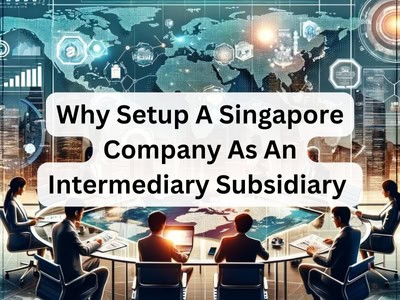This post is also available in:
![]() 简体中文 (Chinese (Simplified))
简体中文 (Chinese (Simplified))
The Reasons for Setup A Singapore Company As An Intermediary Subsidiary
 Southeast Asia is fast becoming a high-priority strategic region where economic growth and development is expected to exceed the global average for the next several years. With rich natural resources, low-cost skilled labour, and ASEAN’s Free Trade Agreement, the region’s wealth of markets and business opportunities are especially attractive for direct investment and trade in infrastructure, oil and gas, mining, agri-food, and information and communications technology.
Southeast Asia is fast becoming a high-priority strategic region where economic growth and development is expected to exceed the global average for the next several years. With rich natural resources, low-cost skilled labour, and ASEAN’s Free Trade Agreement, the region’s wealth of markets and business opportunities are especially attractive for direct investment and trade in infrastructure, oil and gas, mining, agri-food, and information and communications technology.
With an optimistic outlook for Southeast Asia’s economic and business growth, it is not surprising to see international businesses seeking opportunities in the Southeast Asia region.
Take a foreign holding company expanding their businesses into South East Asia for example. There are various structures that the holding company can consider.
Subsidiaries can be set up directly in each country. Alternatively, there is also an option of setting up an intermediary subsidiary in Singapore to hold its foreign subsidiaries.
Some of the key considerations are as follows:
Availability of Avoidance of Double Taxation Agreements
Originate country may not have established double taxation agreements (also commonly referred to as tax treaties) with all subsidiary countries. Using a Singapore company as intermediary holding company will solve this issue. Singapore has concluded numerous tax treaties with different countries, especially in Southeast Asia. Double taxation agreements are important for promoting international trade and investment by improving the transparency of information and certainty of tax positions. They are also essential for the elimination of double taxation that can arise from cross-border transactions, thereby reducing business costs.
It is easy for a Singapore company to be considered as a tax resident to enjoy the benefits of the double taxation agreements. A company is tax resident in Singapore if the control and management of its business is exercised in Singapore. This can be done by holding its board of directors meetings in Singapore.
No capital gains tax
Capital gains are subject to tax in home countries like the US and India. In Singapore, there is no tax on capital gains. Having a Singapore company to hold its subsidiaries for the group ensures the avoidance of capital gains tax on the disposal of any subsidiary.
Taxability of dividends
It is common for subsidiaries to distribute profits back to the parent company by way of dividends. Certain countries may impose taxes on the receipt of dividends. In Singapore, foreign dividends can be tax exempted if they fulfil the following conditions:
- The highest corporate tax rate (headline tax rate) of the foreign jurisdiction from which the income is received is at least 15% at the time the foreign income is received in Singapore;
- The foreign income had been subjected to tax in the foreign jurisdiction from which they were received (known as the “subject to tax” condition). The rate at which the foreign income was taxed can be different from the headline tax rate; and
- The Comptroller is satisfied that the tax exemption would be beneficial to the person resident in Singapore.
For the purpose of this “subject to tax” condition, tax paid or payable on foreign-sourced dividends received in Singapore includes:
- the dividend tax, which is income tax levied on the dividend by the foreign country of source; and
- the underlying tax, which is income tax paid or payable by the dividend paying company on the income out of which the dividend is paid.
Dividends can be therefore be maintained in a Singapore intermediary company and not pay tax back in the ultimate holding company back in the home country.
Consolidation and group relief
Companies that wish to develop new lines of businesses or venture into new business sectors may end up having various business activities. Separate entities can be incorporated for each business activity and be grouped under an intermediary holding company. Financial results are consolidated at intermediary holding company level. Singapore companies which are part of a group within Singapore can enjoy the benefits of the group relief scheme. Group relief enables Singapore companies to deduct unutilised capital allowances/ trade losses/ donations of a Singapore company from the assessable income of another Singapore company in the same group.
Mitigating risks
There may be a need for a branch to be set up in Southeast Asia. Instead of having the company in the home country to be the branch’s head office, a Singapore company can be its head office. As a branch is an extension of a head office, the risks can be better managed at Singapore intermediary company level and not affect the ultimate holding company back in the home country.
Fund raising
Fund raising may be required for a certain region and not necessarily for the whole group. A Singapore company can be established to attract investors on a sub-group level. There is also the option of Initial Public Offering (IPO) in Singapore.
Structuring of companies should be backed by commercial reasons and not just for tax benefits. If the group structure is planned well to include an intermediary Singapore company, unnecessary withholding taxes can be saved through reduced tax treaty rates or exemption. Capital gains tax or further tax on dividends can also be avoided.
If you require assistance in Incorporation of a Singapore company or require corporate income tax services in Singapore, feel free to contact us and let our professional team help you.



